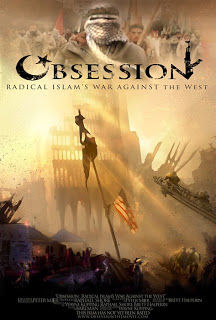In Wayne Kopping’s “Obsession”, a powerful collection of primary source footage is woven together to highlight the dangers of fanatical Islamic ideology. The film also interviews experts such as Prof Khaleel Mohammed and Prof. Salim Mansur; journalists such as Khaled Abu Toameh; and individuals who have lived in the Islamist environment, such as Nonie Darwish, Walid Shoebat and Brigitte Gabriel.
Hate being broadcast on television, illustrates the dangerous phenomenon present in the Muslim world, with blood libels aired on Iranian television and Imam’s telling his listeners to kill Jews on Palestinian state run television. It gets worse when young children are taught to hate and kill Jews, broadcasted expressing their desire to die for such. Such incitement and hatred is a narrative that many Muslim heads of state would prefer you to be oblivious to.
These Islamic leaders have a clear message that they desire Islam to be spread globally, and explain it themselves in this film. Islamic leaders are shown in London speaking about their dreams of an Islamic government with Sharia law, in which non-Muslims would be equal to slaves.
The film goes on to draw a connection between the Nazi’s and Islamism, with the Palestinian religious leader Haj Amin al-Husseini shown forging a relationship with Hitler. Muslim extremists using propaganda and hatred much like the Nazi’s did, is evident. Both groups indoctrinated their children with hate; spoke of gaining control of the world and of hate towards specific groups of people. The threat of both groups was also downplayed at first. The extremist Islamic rhetoric of destroying Israel and what that implies clearly mirrors pre-war Nazi rhetoric of destroying the Jews.
A weakness in the film is the interview with Walid Shoebat, described as a former Palestinian terrorist. Recent investigations have cast doubts on his claim, with no record found of his imprisonment in Israel or news reports of his alleged bomb throwing at a bank. http://www.jpost.com/Features/Article.aspx?id=96502
Minimizing on graphic violence and with a gentle musical score, it is a bit repetitious in terms of the quantity of hate speech shown. The film concludes with speakers condemning terrorism along with the need for both reform of radical Islam and the confrontation of nations that freely use hate speech and misuse Islam.
by Gilad Skolnick


